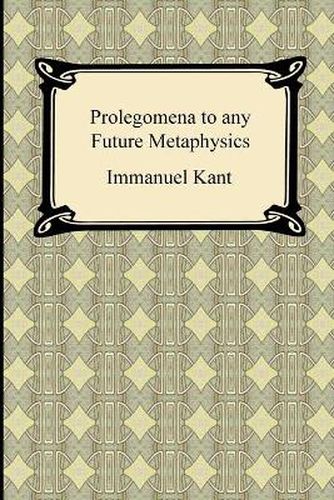Readings Newsletter
Become a Readings Member to make your shopping experience even easier.
Sign in or sign up for free!
You’re not far away from qualifying for FREE standard shipping within Australia
You’ve qualified for FREE standard shipping within Australia
The cart is loading…






In 1781, Immanuel Kant published his first and most famous work, the Critique of Pure Reason. To the German philosopher’s dismay, the work was at first poorly received and largely misunderstood by his readers. As a result, two years later Kant produced his Prolegomena to any Future Metaphysics that will be Able to Present Itself as a Science to serve as an introduction to the Critique. He restated the main ideas of his philosophy in what Schopenhauer, in 1819, declared was the finest and most comprehensible of Kant’s principal works, which is far too little read, for it immensely facilitates the study of his philosophy. Immanuel Kant (1724-1804) was considered to be one of the most important and influential figures in Western philosophy for his work in the areas of metaphysics, anthropology, theoretical physics, logic, and moral philosophy. Remarkably, Kant never left the town of Koenigsberg, Germany, where he had been born, received schooling, and served as lecturer at the University for many years.
$9.00 standard shipping within Australia
FREE standard shipping within Australia for orders over $100.00
Express & International shipping calculated at checkout
Stock availability can be subject to change without notice. We recommend calling the shop or contacting our online team to check availability of low stock items. Please see our Shopping Online page for more details.
In 1781, Immanuel Kant published his first and most famous work, the Critique of Pure Reason. To the German philosopher’s dismay, the work was at first poorly received and largely misunderstood by his readers. As a result, two years later Kant produced his Prolegomena to any Future Metaphysics that will be Able to Present Itself as a Science to serve as an introduction to the Critique. He restated the main ideas of his philosophy in what Schopenhauer, in 1819, declared was the finest and most comprehensible of Kant’s principal works, which is far too little read, for it immensely facilitates the study of his philosophy. Immanuel Kant (1724-1804) was considered to be one of the most important and influential figures in Western philosophy for his work in the areas of metaphysics, anthropology, theoretical physics, logic, and moral philosophy. Remarkably, Kant never left the town of Koenigsberg, Germany, where he had been born, received schooling, and served as lecturer at the University for many years.